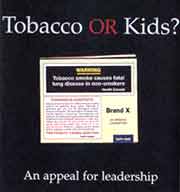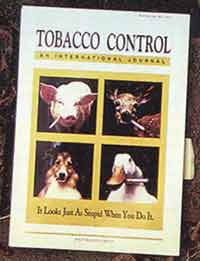ANNEX:
Recommendations of the 1998 Working Group on Tobacco or Health
RECOMMENDATIONS IN RELATION TO THE 2000-2004
ACTION PLAN ON TOBACCO OR HEALTH
|
to
CONTENTS |
WORKING GROUP ON TOBACCO OR HEALTH
Manila, Philippines, 17-20 November 1998
GENERAL
- In collaboration with the members of the Working Group, and consistent
with details of the Framework, WHO/WPR should finalize the 2000-2004
Action Plan on Tobacco or Health for endorsement by the 1999 WHO Western
Pacific Regional Committee.
- In preparation for implementation of the 2000-2004 Action Plan,
WHO should consider funding and implementing the proposed 1999 Tobacco
or Health Project.
- To support finalization of the 2000-2004 Action Plan and its subsequent
implementation, and to support implementation of the proposed 1999
Tobacco or Health Project, WHO should, at the earliest possible date,
provide staff to support implementation of the Tobacco or Health programme
on a full-time, dedicated basis.
- WHO and Member States should develop and implement their regional
and national Plans of Action with a view towards supporting the development
and adoption of the international Framework Convention on Tobacco
Control.
| 1.0 |
NATIONAL/REGIONAL PLANS OF ACTION ON TOBACCO
OR HEALTH |
- To reach the overall aim of achieving a measurable and sustainable
reduction in smoking prevalence rates, WHO and Member States,
in partnership with others, should focus on the following approaches:
- develop and implement National Plans of Action on Tobacco
or Health, with the goal of having formal Plans in place in all
Member States by the end of 2001;
- develop and implement policies, legislation and regulations
that deter tobacco use, including those that affect pricing and
marketing; advertising and promotional activities; and smoking
in public places, with the goal of having effective policies
in place in all Member States by the end of 2002; and
effective legislation and regulations in place in all Member
States by the end of 2003;
- develop and use advocacy, educational and promotional campaigns
and materials that encourage people not to start and to quit
smoking, appropriate to the Region as a whole by the end of
1999, and appropriate to each Member State as an integral
part of their National Plan development and implementation activities;
- monitor and evaluate the effectiveness of Tobacco or Health
initiatives comprising the Regional/National Plans of Action,
including indicators of progress that are consistent with
available data, and indicators that are based on the development
of appropriate new data.
As a minimum, WHO/WPR's overall tobacco or health effort should comprise
the details of the 2000-2004 Action Plan on Tobacco or Health,
as well as the related details of other relevant WHO programmes
such as Noncommunicable Diseases, Health Promotion, Alcohol and Drug Abuse,
and Mental Health.
| 2.0 |
POLICIES, LEGISLATION AND REGULATIONS THAT
DETER TOBACCO USE |
- WHO, in collaboration with other partners, should facilitate the
reduce the level of harmful substances in tobacco products; ands that:

- ban all advertising and promotion of tobacco products, trademarks,
brand names and logos;
- create and expand smoke-free environments in enclosed public
places, including health premises, restaurants, cinemas, theatres,
public transport and indoor places of work; and especially all
areas frequented by young people
- ban the importation, manufacture and sale of smokeless tobacco;
- prohibit the sale of tobacco products to minors;
- prohibit cigarette-vending machines in public places;
- reduce the level of harmful substances in tobacco products;
and
- ensure that all tobacco products and packages (and any advertisements)
are labeled with strong, factual and varied warnings.
In all of their work, WHO and Member States should seek to create health
infrastructures that will support and sustain the development and implementation
of policies, legislation and regulations that deter tobacco use.
| 3.0 |
ADVOCACY, EDUCATIONAL AND PROMOTIONAL CAMPAIGNS
AND MATERIALS |
- In support of National Plans of Action, develop and implement culturally
relevant, timely and appropriate advocacy, educational and promotional
campaigns and materials. The aim of these campaigns and materials
should be to raise awareness and promote behavioral change among target
audiences such as government officials, nongovernmental organizations,
the mass media, community leaders and decision-makers, and people
in settings where they live, work and play. Among other things, such
campaigns and materials should focus on:
 |
- encouraging tobacco users to quit through the use of mass
media, health professionals and other means; and
- preventing young people from beginning to use tobacco.
|
| 4.0 |
RESEARCH, MONITORING AND EVALUATION |
- WHO, at the global, regional and national levels, should, in collaboration
with Member States and others, develop a clearer understanding of
tobacco industry strategies as a basis for establishing and implementing
National Plans of Action.
Existing health databases, as well as other databases related to tobacco
control, and the infrastructures which support them, should be strengthened
to enhance the quantity and quality of tobacco-or-health-related information.
Particular attention should be paid to the proper analysis of data. New
data should be developed to support specific and clearly defined Action
Plan development and implementation needs.
|

